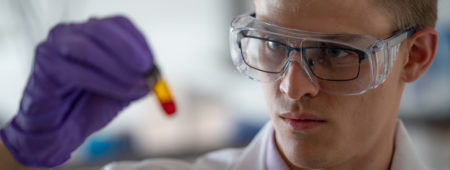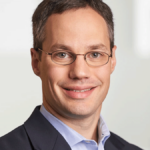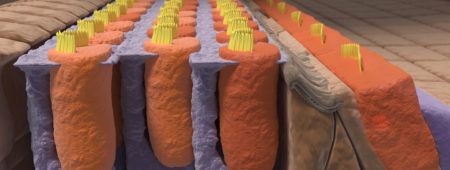
Restoring Hearing Loss

Waves crashing on a shore, a Brahms symphony, and children’s laughter. These are among the pleasing sounds that Hertz Fellow Chris Loose hopes to restore to the hearing impaired.
Loose's company, Frequency Therapeutics, last year tested a combination therapy of two small molecules (FX-322) on patients with mild to moderately severe hearing loss. Multiple people in the study showed statistically significant improvements in key measures of clarity, including four patients who doubled their word recognition scores.
“We saw a number of people with clinically significant hearing improvements. This has never been achieved before,” said Loose, chief scientific officer of Frequency Therapeutics and executive director of Yale’s Center for Biomedical and Interventional Technology. In late 2019, the company launched a Phase 2a study with 96 patients to help understand dosing, patient populations, and endpoints.
Permanent hearing loss often occurs when hair cells in the cochlea are damaged or destroyed. Exposure to excessive noise, aging, infection, or certain medications can destroy the delicate hair cells. These sensory hair cells do not regenerate once they are damaged.
Injected directly into the ear, the small molecules jump-start dormant progenitor cells in the cochlea and regrow the hair cells. Progenitor cells are descendants of stem cells that are hard-coded to turn into one or two specific kinds of cells.
Worldwide Impact
The impact of this work could be vast. An estimated 70 million Americans and 800 million people worldwide experience hearing loss. More than 1.1 billion teens have the potential for hearing loss due to the use of electronic devices, according to the World Health Organization.
And more than just hearing could be at stake. Untreated hearing loss increases the risk of dementia by 50 percent, depression by 40 percent, and falls by 30 percent over a 10-year period, according to a study published last year in JAMA Otolaryngology—Head and Neck Surgery.
“Since I was in middle school, I’ve wanted to have an impact on human health,” said Loose. “Regenerative medicine holds great promise for patients. In the future, we might be able to apply this technology to diseases of the skin, eyes, bones, muscles, and lungs.”
In addition to its work on hearing, the company has initiated a discovery program to determine if it’s possible to activate the progenitor cells within the brain to reverse damage done by multiple sclerosis.

Fueled by the Hertz Fellowship
The Hertz Foundation played an important role in his success, Loose said. “The fellowship gave me five years of independence when I could begin asking risky questions and having bold ideas. This opportunity was personally rewarding and could have a tremendous impact on patients.”
Frequency Therapeutics based its use of small molecules on research by Massachusetts Institute of Technology (MIT) Professor Robert Langer and Harvard Medical School’s Jeff Karp.
“I came to MIT for graduate school and to find a project that would have legs,” Loose said. While completing his doctorate in chemical engineering, he worked in Langer’s laboratory and found a business partner in David Lucchino, a mid-career executive who was pursuing a master of business administration. The three men co-founded Semprus BioSciences, a company that brought to market a vascular catheter with a coating that reduces blood clots, and sold the company in 2012. Loose and Lucchino continued their partnership at Frequency Therapeutics, where Lucchino is the president and chief executive officer.
Loose wants to share what he’s learned about bringing innovative technology to the market.
“I’m eager to be involved in mentoring Hertz Fellows and others as well. I want to teach them how to take the early steps,” he said. “I tell people not to be too risk-averse. As long as you’re working on something important and building skills and networks, you’ll have great career options. I also caution people who are launching a venture to have a well-rounded team and a sound plan.”
By Jeannine Mjoseth

